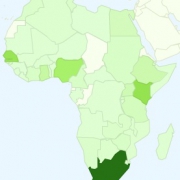Online resources to monitor Mali coup events (including YouTube video from state television)
Instead of a post on how Malians are using social media to promote the now-delayed April 29th, 2012 presidential elections, we turn to see how social media has been used to spread information of a military coup on March 22, 2012.
 By now, word is out that Malian army officers toppled President Amadou Toure’s government and suspended the constitution over the state’s handling of a Touareg rebellion in northern Mali. Something seemed amiss when the official Twitter account of Amadou Touré, the Malian President, denied a coup attempt and then went silent after days of consistent Tweets.
By now, word is out that Malian army officers toppled President Amadou Toure’s government and suspended the constitution over the state’s handling of a Touareg rebellion in northern Mali. Something seemed amiss when the official Twitter account of Amadou Touré, the Malian President, denied a coup attempt and then went silent after days of consistent Tweets.
Most Malians may not use the Internet, but that doesn’t mean the Internet can’t provide the outside world with a glimpse of what is happening in the streets of Bamako. In fact, this marks the first time the world has been able to watch military leaders speak to the public immediately following a transfer of power. Within a day, videos from state TV were already on YouTube. To some degree, it is surreal to watch a group of Malian soldiers in fatigues calmly address a frightened nation after they eliminated democratic rule moments before. In the video below, the army explains why they felt a coup was necessary and then cites goals of empowering the army to unify all cities & organize free and transparent elections as soon as possible.
Since Wednesday’s coup, a handful of journalists, Malians, and media outlets have commented in real-time on events in Bamako. Kudos to CPJ for such quick analysis, MaliActu.net for such unique video, and Tommy Miles for his unmatched coverage:
- Perhaps the best review of how word of the coup spread online comes from Mohamed Keita, Africa Advocacy Coordinator for the Committee to Protect Journalists. He has written an in-depth look on how social media spread news of the coup, with dozens of sources. His conclusion: traditional media is limited in times of fast-breaking news.
- Mali Actualités, a Malian news site has released recent video from state TV ORTM onto YouTube. Six videos totaling 6,000 views have been uploaded since the coup (one is embedded at the top of this post).
- Tommy Miles, a self-described “West Africa watcher” has created a list of 20 Twitter accounts to follow for news about Mali. He has posted and re-tweeted more than one hundred pieces of information. Especially interesting are how the Mauritania government supposedly supports the Malian coup, transcripts from TV announcements, and links to media articles.
- GlobalVoices has posted a dozen or so Twitter reactions from Malian citizens. The consensus: great surprise by the recent events.
- Phil Paoletta, an American living in Bamako has provided a steady stream of observations. One of the most interesting is how state TV so casually alternates from military speech to music videos.
- Jules Cavendish, a reporter for a variety of international publications, happens to be in Bamako and has provided poignant commentary on the situation (ie. “Could the irony of Toure’s legacy be that democracy only lasted as long as he was around?”)
- Martin Vogl, freelance journalist working for the BBC and AP, was considered one of the most credible resources for international media to cite.
- Fabien Offner, a West African journalist, made a couple of updates, including how one presidential candidate’s home was vandalized.
- Bruce, an expat living in Bamako, has posted detailed accounts of his past couple of days on his WordPress blog, including insights from the US Embassy.
- MaliJet has extensive coverage of the news, plus dozens of reactions and some images as does Journal du Mali.
- Hashtags have included #Bamako #Mali #ORTM #SanogoShow.
The military claims to have formed a transitional council that will organize elections. The group also plans to restore power to a democratically elected leader, but a date has not been set. A shame, considering democratic elections were only a month away…
Note: Although state television and state radio were taken over (as is protocol for African military coups), the Internet was not explicitly shut-down.







































